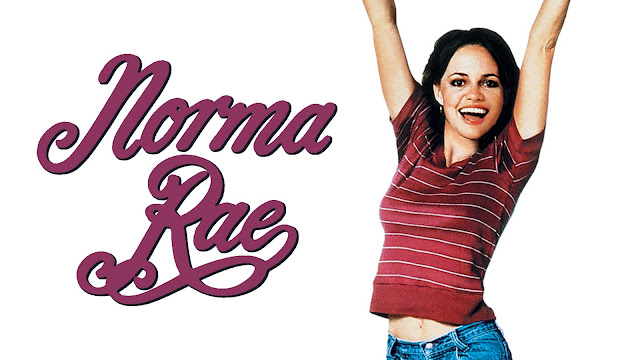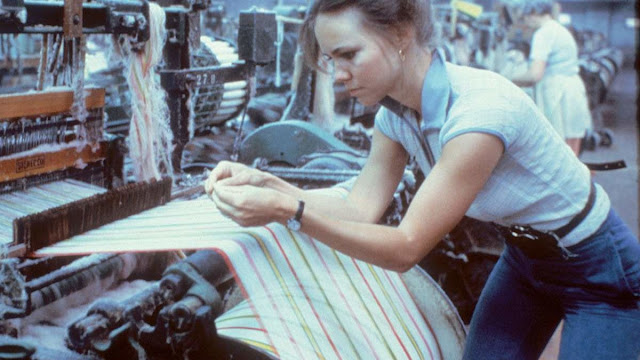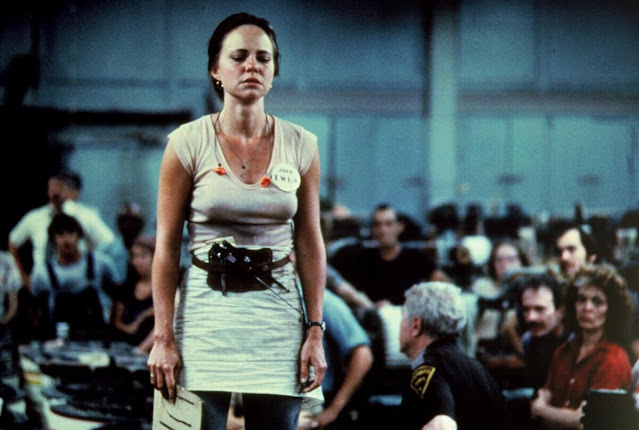Your experience with Norma Rae may depend somewhat on your opinions of unions in general. My father worked a union job all of his life, paying his dues and barely getting along. He had a good pension but not the best income in the world. I remember always struggling for money, and my mother having to work extra all the time just to make ends meet. We never starved, but we rarely had any luxuries, either. My situation isn’t much better. I don’t work a union job, and while I put money away every two weeks, I don’t have a pension, just a 401K that depends on the health of the stock market to grow and develop. Both of us struggled to get by, so I don’t always see what value the union brought for my father nor what I’m missing out by not having one in my life.
The situation depicted in Norma Rae is quite different from that of my experiences with unions. I don’t remember my father ever having to go on strike, but then again, all of that was resolved long before my father first started working for the railroad industry. In Norma Rae, we are looking at a cotton mill that is without a union, and the management seems determined to drive their workers into the hands of one. The work environment, as we see it, is so caustic that it is a miracle the workers aren’t storming the union headquarters in their haste to join. The only thing the mill lacks is overlords with whips to keep the workers in line and on task.
The film opens on Norma Rae Wilson (Sally Field), a young woman living in a small town that is dependent on a local cotton mill for employment. But this mill has taken a physical toll on her and her family thanks to the poor working conditions, the lack of air conditioning, and an overall disregard for the health and safety of the workers. Her frequent protests are initially alleviated by a promotion to spot checker, a position that comes with a much-needed pay raise but leads to loneliness when her work friends turn their backs on her for enforcing the quotas and “finking” to the bosses. Even though she needs the extra pay, she cannot handle losing her friends and family and requests to be fired. Instead, she is demoted back to her old job working the line.
Things change for her when two different men enter her life. The first is Sonny Webster (Beau Bridges), a former co-worker who asks her out on a date. After a brief courtship, the two marry. He brings with him a daughter from a previous marriage, and she has children of her own from two separate men in her past. Sonny represents kindness and love, something she has seen little of in her life, and because of that, she accepts his offer of marriage.
The second man is Reuben Waershowsky (Ron Leibman), a pushy union organizer whom Norma has seen outside the cotton mill handing out tracts and attempting to organize the workers. Reuben is a strong-willed individual who comes across as bitter and angry, but he also seems to have a vested interest in helping the workers regain some of their basic human rights, rights that the mill seems determined to ignore. Norma is inspired by one of his speeches to join the cause to unionize, something that causes her to frequently be away from home. This puts her in conflict with her new husband as well as some of the workers who are reluctant to join the cause.
To retaliate against the meetings, the management rearranges work schedules and posts fliers against the union that are designed to divide the black and white workers, diluting the momentum. But when Norma’s father was refused a break when he was clearly having heart attack symptoms and dies on the job, Norma is more than ever determined to continue the fight. Eventually, her actions will inspire her fellow workers to strike and force the situation, allowing the union in to make necessary changes in the workplace to protect the workers and clean up the business.
Sally Field won her second Oscar for her performance in this film. This is the film where she infamously gave the speech “I can’t deny the fact that you like me, right now. You like me!” This is often misquoted and made fun of when looking at iconic Oscar speeches. For her part, Sally Field was making the point that her first Oscar felt like a fluke, but winning a second one was cementing in her heart that she was accepted as a good actress. She had an unconventional path to the Oscars, including being known for such a strange and unusual television series, The Flying Nun. But she had proven, and still proves, that she is a force to be reckoned with.
She is basically playing real-life textile worker Crystal Lee Sutton, a woman who fought the J.P. Stevens Textiles mill in North Carolina. Whole scenes from the film are taken directly from events in her battle with the mill, including the eventual unionizing of the mill as a direct result of her actions. One of the film’s most iconic scenes is when Norma writes “UNION” on a sheet of cardboard and stands defiantly with the sign raised as she is being escorted out of the mill, inspiring the workers to shut off their machines in their own protests. This scene was closely based on a protest Lee Sutton did in 1978.
While this film successfully portrays a situation where a union can step in and fix unsafe working conditions, it does so by showing an extreme example of bad business practices. We hear in the media about situations such as at the Amazon warehouses where people are demanding the unions step in. I hear similar ideas about retail giants like Walmart and Target and, having worked for retail, I feel that the unions really have no business there. Many of the issues unions used to have to get involved in are now regulated by government agencies like OSHA. All of this is, of course, just an opinion. Unions still have a place in some industries, and a situation like the one in this film is clearly one of those.
This is Sally Field’s film. She carries it in such a way that we stay with it even when Ron Liebman is doing his best to push us away. She humanizes it, giving us a point-of-view character we can sympathize with and get behind. This film hit home with critics and Hollywood in general, which is a union town thanks to groups like the Screen Actors Guild and all the others that protect the creative minds in the entertainment industry. While not everyone agrees with the need for unions, this film finds a way to give us an example where it is needed and can be beneficial. But, once again, the situation in the film is an extreme example, designed specifically so that we cannot help but be on the side of the union.
Academy Award Nominations:
Best Picture: Tamara Asseyev and Alex Rose
Best Actress: Sally Field (won)
Best Adapted Screenplay: Irving Ravetch and Harriet Frank Jr.
Best Original Song: “It Goes Like This” music by David Shire; lyrics by Norman Gimbel (won)
____________________________________________________
Release Date: March 2, 1979
Running Time: 110 minutes
Rated PG
Starring: Sally Field, Ron Liebman, Beau Bridges, Pat Hingle, and Barbara Baxley
Directed By: Martin Ritt









Comments
Post a Comment